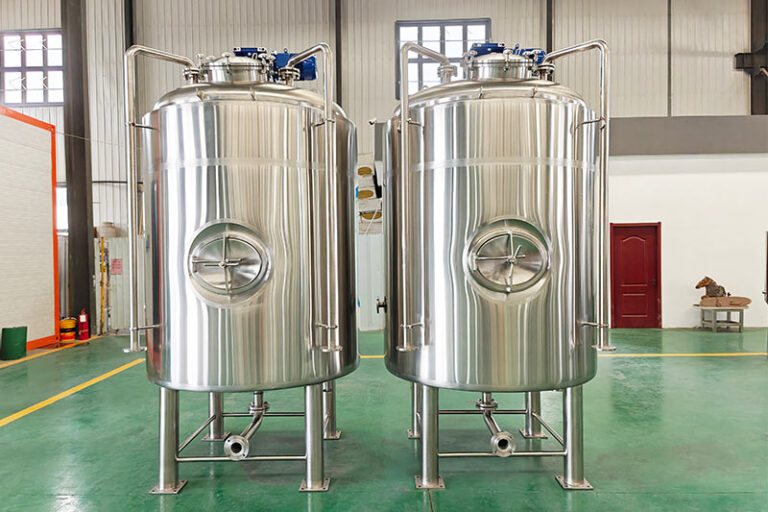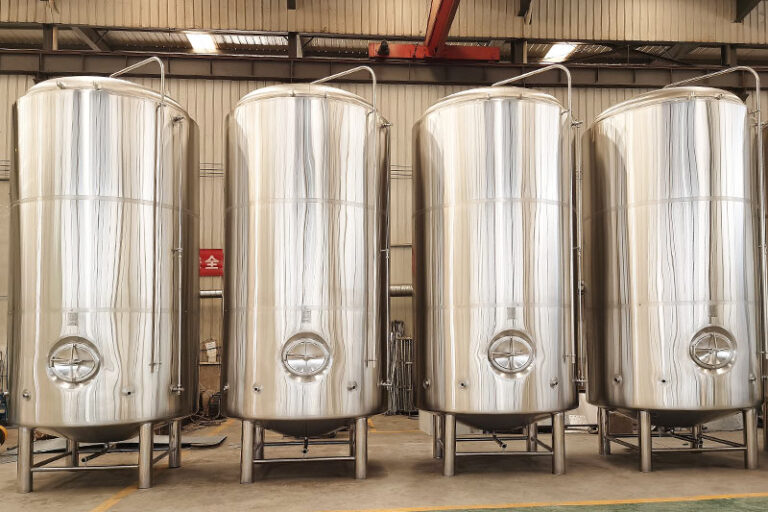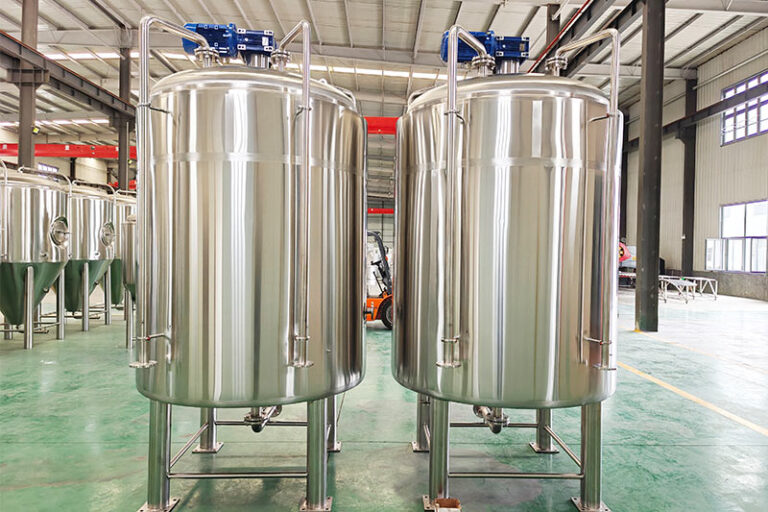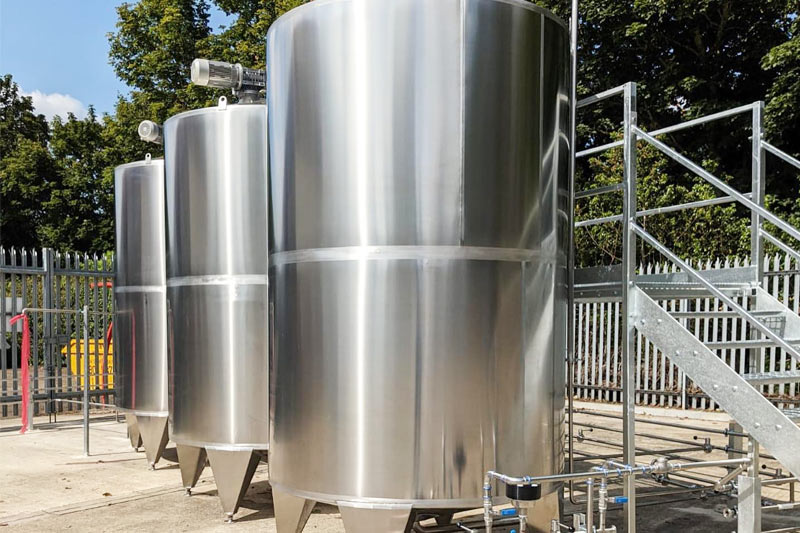Characteristics of stainless steel storage tanks
- Strong corrosion resistance: Stainless steel storage tanks are made of stainless steel materials and have excellent corrosion resistance. Whether facing chemical substances such as acid, alkali, and salt or in harsh environments such as humidity and high temperature, stainless steel storage tanks can maintain good stability and are not easily damaged by corrosion. This makes it widely used in chemical, pharmaceutical, and other industries, and can safely store various corrosive liquids and gases.
- High strength: Stainless steel materials have high strength and hardness, which enables stainless steel storage tanks to withstand greater pressure and weight. During storage and transportation, stainless steel storage tanks can maintain a stable structure, are not easy to deform and break, and ensure the safety of stored substances.
- Good sealing: Stainless steel storage tanks usually use advanced sealing technology, which can effectively prevent the leakage and volatilization of stored substances. Good sealing can not only ensure the quality and safety of stored substances but also reduce pollution to the environment.
- Cleanliness and hygiene: The surface of stainless steel materials is smooth, not easy to breed bacteria and dirt, and easy to clean and disinfect. This makes stainless steel storage tanks widely used in food, pharmaceutical, and other industries, and can ensure the hygiene and safety of stored substances.
- Beautiful and durable: Stainless steel storage tanks have a beautiful appearance and good decorative properties. At the same time, stainless steel materials have a long service life and can be used for a long time in various harsh environments, reducing the cost of equipment replacement and maintenance.

Types of stainless steel storage tanks
Vertical stainless steel storage tanks
Horizontal stainless steel storage tanks
Spherical stainless steel storage tanks
Other types of stainless steel storage tanks
Application fields of stainless steel storage tanks
- Chemical industry: In the process of chemical production, a large number of storage tanks are needed to store various chemical raw materials, finished products, and intermediate products. Stainless steel storage tanks have become the preferred equipment in the chemical industry due to their corrosion resistance, high-temperature resistance, and pressure resistance. For example, they are used to store strong acid and alkali substances such as sulfuric acid, hydrochloric acid, and nitric acid, as well as various organic solvents, petrochemical products, etc.
- Food industry: The food industry has extremely high requirements for the hygiene of storage equipment. Stainless steel storage tanks are widely used in food processing and storage due to their smooth surface, easy-to-breed bacteria, easy of cleaning and disinfecting, etc. Such as storing food raw materials and finished products such as milk, juice, beer, and edible oil.
- Pharmaceutical industry: The pharmaceutical industry has more stringent requirements for storage equipment and needs to comply with pharmaceutical production specifications and hygiene standards. Stainless steel storage tanks can be aseptically treated to ensure the quality and safety of drugs. Used to store pharmaceutical raw materials, intermediates finished products, etc.
- Environmental protection industry; With the continuous improvement of environmental awareness, the demand for storage equipment in the environmental protection industry is also increasing. Stainless steel storage tanks can be used to store wastewater, waste gas waste residue, etc., to prevent the leakage and spread of pollutants and protect the environment.
- Other industries: In addition to the above industries, stainless steel storage tanks are also widely used in petroleum, metallurgy, electric power, building materials, and other industries. For example, they are used to store energy products such as oil and natural gas, as well as various metal ores, building materials, etc.

Maintenance and care of stainless steel storage tanks
Regular cleaning
Check the sealing performance
Maintenance accessories
Stainless steel storage tanks are usually equipped with accessories such as level gauges, thermometers, and pressure gauges. The normal operation of these accessories is crucial to the safety and stability of the storage tanks. Therefore, it is necessary to regularly maintain and maintain these accessories to ensure their normal operation. During maintenance, you can operate according to the instruction manual of the accessories and calibrate and overhaul them regularly.
Prevent corrosion
Safe operation

FAQ
Q1: What are the types of materials for stainless steel storage tanks?
A: Common stainless steel storage tank materials are 304 stainless steel and 316 stainless steel. 304 stainless steel has good corrosion resistance, heat resistance, and mechanical properties, and is suitable for most conventional storage needs. 316 stainless steel is more resistant to corrosion, especially to corrosive media such as chlorides, and is suitable for use in marine environments or occasions with special corrosive requirements.
Q2: How to judge whether the material of a stainless steel storage tank is qualified?
A: You can check the material test report, quality certificate, and other documents of the product to confirm whether the material meets the standard.
Q3: In which industries are stainless steel storage tanks mainly used?
A: Stainless steel storage tanks are widely used in chemical, food, pharmaceutical, environmental protection, oil, natural gas, and other industries.
Q4: How to choose a suitable stainless steel storage tank?
A: When choosing a stainless steel storage tank, the following factors need to be considered:
- The properties of the stored material: including chemical properties, physical properties, temperature, pressure, etc., to determine the material, specifications, and structural form of the storage tank.
- Storage capacity: Determine the volume of the storage tank according to actual needs.
- Use environment: Consider the environmental conditions of the storage tank, such as temperature, humidity, corrosiveness, etc., and select appropriate anti-corrosion measures and thermal insulation performance.
- Budget cost: Under the premise of meeting the use requirements, select a storage tank with high-cost performance.

